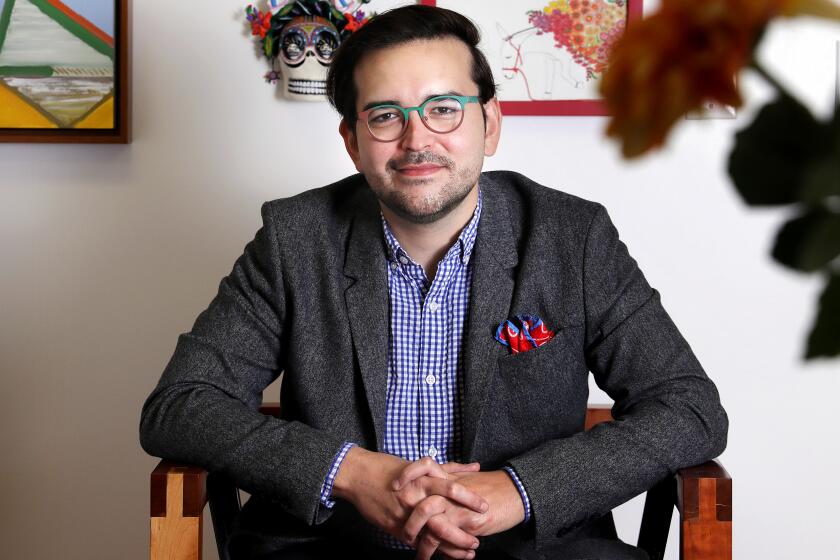Selena’s star rises again in new trailer for Netflix series about the Tejano icon

“Selena: The Series” trailer on Netflix.
“That’s why I’m leaving it up, up to you,” young Selena (Madison Taylor Baez) croons, swooping to catch a firefly in a jar.
“It’s about love,” her father (Ricardo Chavira) tells her of her 1974 Donny and Marie Osmond cover. “How you had it and then you lost it.”
“It feels like there’s a fist around your heart,” her mother (Seidy López) says.
“Well, I don’t want that,” young Selena says with conviction. Her parents laugh.
“If you stand around and wait for what you want, you’re gonna be waiting your whole life,” her father says. “You have to go and get it.”
Thank God we won’t have to wait much longer. After teasing fans with a sneak preview earlier this month, Netflix finally dropped the official trailer for “Selena: The Series” Monday. The musical series premieres Dec. 4.
“You can’t like him,” Selena’s sister and drummer, Suzette Quintanilla (Noemí Gonzalez), says in the trailer as Selena makes eyes at her guitarist, Chris Peréz (Jesse Posey). “I mean it. Dad would freak out.”
Netflix’s highly anticipated “Selena: The Series,” starring Christian Serratos, finally has a release date after COVID-19 halted production.
The trailer captures the fact that the late Tejano music icon’s rise to fame was a family affair: Her father signed Selena to EMI’s Capitol Records, her mother supported her behind the scenes, her sister played the drums in their Selena y Los Dinos band and her brother helped produce and write such hits as “Como la Flor.”
The iconic 1992 track — which was remixed in 1995 for Selena’s posthumous “Dreaming of You” album — features heavily in the teaser trailer for the series, featuring “The Walking Dead’s” Christian Serratos in the role of the Mexican American star.
“If you keep practicing, pretty soon, it’s all gonna pay off,” her father’s voice says in the trailer. “When I see you on that stage, I still see the 6-year-old girl singing in our backyard.”
The Netflix synopsis describes the series as “Mexican American Tejano singer Selena [coming] of age and [realizing] her dreams” while “she and her family make tough choices to hold on to love and music,” but Selena means all of that and much more to the show’s creators.
“I’d really describe ‘Selena: The Series’ as a culmination of the work that we have put in to build a company that could highlight these types of themes, these types of stories and bring it to a mainstream market,” producer Jaime Dávila recently told The Times. “More than anything, we’re trying to show Hollywood that there’s this huge market of Latinx/Latino people; that our stories are American stories; that our stories are global stories.”
The Quintanilla family too had a hand in bringing Selena’s story to television: They developed and executive produced the series. The show has big fringe boots to fill — 23 years later, the Oscar-nominated film “Selena” (starring Jennifer Lopez) is still beloved by many Latino and Chicano fans. Rico Martinez, the head of content at Campanario Entertainment, the production company behind the series, knows that well.
Producer Jaime Dávila wants the industry to know this about Latinos: “We’re not a separate category. We’re part of America. We’re part of the mainstream.”
“We’re not going to deny that the movie has a special place in everyone’s hearts,” Martinez recently told The Times. “It evokes an emotion that is hard to describe. And it will always have that emotional pull with audiences. We will never touch that. We will never take away from that. When you’re doing two seasons’ worth of 18 episodes, it’s going to be a different story.”
The biographical drama breaks down into two parts, tracing Selena’s journey from small gigs in Corpus Christi, Texas, to international stardom. In 2018, The Times asked fans: “What does Selena mean to you?”
“Watching Selena walk this tightrope with grace made the struggle seem less lonely,” fan Crystal Zamora responded. “She had so much poise when she performed and addressed the media. For me, and perhaps for others, being of mixed cultures and identity is a lifelong struggle of proving to others who we are while trying to figure that out for ourselves.”
More to Read
The complete guide to home viewing
Get Screen Gab for everything about the TV shows and streaming movies everyone’s talking about.
You may occasionally receive promotional content from the Los Angeles Times.








